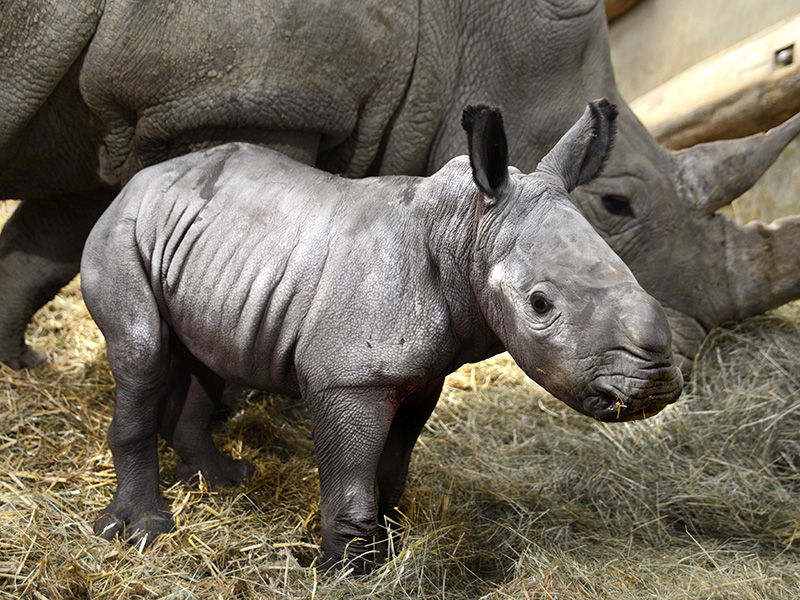Yet another White Rhino born in the Cotswolds!

Queenie is the newest addition to the Rhino family at Cotswold Wildlife Park & Gardens.
This year marks Her Majesty The Queen's Platinum Jubilee year.
To celebrate this unprecedented anniversary, an apt name was chosen for the new calf. Managing Director of Cotswold Wildlife Park, Reggie Heyworth, explains: "We feel very lucky to have another baby female Rhino, which is our fifth female baby in a row. All the Rhinos here are named after very special people and I think everyone agrees that 2022 will always be special because of Queen Elizabeth’s Platinum Jubilee. I thought it might be a bit presumptuous to call our new baby ‘Elizabeth’, so I have christened her ‘Queenie’ instead. I think it is a perfect name for a young lady Rhino!"
The new arrival is the ninth Rhino calf to be born at the Burford collection and is Monty and Nancy’s fifth breeding success together. Her birth is testament to the dedication of the mammal keepers and the Park’s commitment to the European Breeding Programme (EEP).
Visitors can see the new calf daily from 10am in the solar-powered Rhino House or the large Rhino paddock overlooking the Manor House.
Award winning photographer, Rory Carnegie, captured Queenie's first day on camera.
More about rhinos at Cotswold Wildlife Park
• Monty and Nancy are both fifteen years old. In 2009, Nancy (along with another female called Ruby) made the eleven thousand kilometre journey from Mafunyane Game Farm in South Africa to the UK to join young male Monty at their new Oxfordshire home.
• History was made in 2013 when Nancy gave birth to Astrid – the Park’s first Rhino breeding success.
• Cotswold Wildlife Park has raised over £120,000 for conservation work in Africa in the last ten years through various fundraising events. To find out more please visit https://www.cotswoldwildlifepark.co.uk/conservation.
• The Park sponsored Tusk Trust’s evocative “Not For Sale” conceptual garden at the 2017 RHS Hampton Court Flower Show. The garden highlighted the brutal poaching trade and was awarded silver by the judges.
• White Rhinos (Ceratotherium simum ssp. simum) are the largest of the five Rhino species and range throughout the grassland of Southern Africa.
• Females only reproduce every two-and-a-half to five years, so the window of opportunity for successful reproduction is limited. After a gestation period of sixteen to eighteen months, a single calf is born.
• These iconic animals were once the rarest of any Rhino species and were on the verge of extinction in the early 1900s, when it was believed only twenty to fifty animals remained in their native African homeland. Thanks to excellent and sustained protection, they are now the most common of the five Rhino species. Three of the five Rhino species – the Black, Javan and Sumatran – are critically endangered.
Cotswold Wildlife Park is committed to Rhino conservation and works closely with the UK based conservation charity Tusk Trust to protect Africa’s many threatened species. The effects of the coronavirus pandemic have had a devastating impact on Rhino conservation and poaching has once again escalated to serious levels. Reggie Heyworth, the Park’s Managing Director and a Tusk Trust Ambassador, explains: “Conservation programmes throughout Africa’s wildlife areas and national parks often depend on income from tourism and support from charities such as Tusk Trust. With so few tourists visiting Africa, it is all the more important for us to support the work of Tusk Trust, who fund over forty programmes throughout sub-Saharan Africa, including vital work to protect rhinos and elephants from poachers”. For more information about Tusk Trust, please visit www.tusk.org.
Explore Gloucestershire
3 March 2022
For further information.
OTHER NEWS
